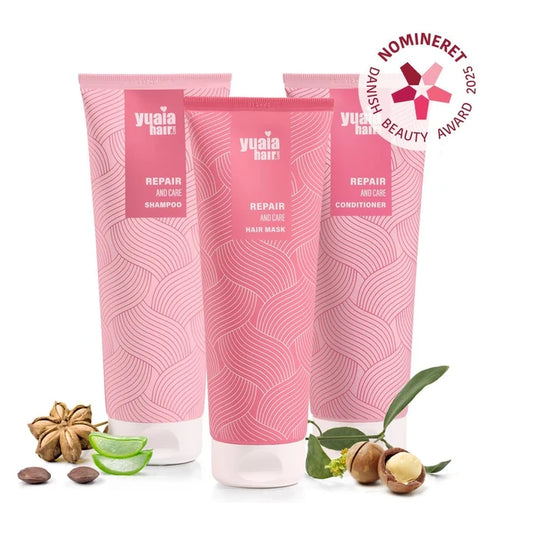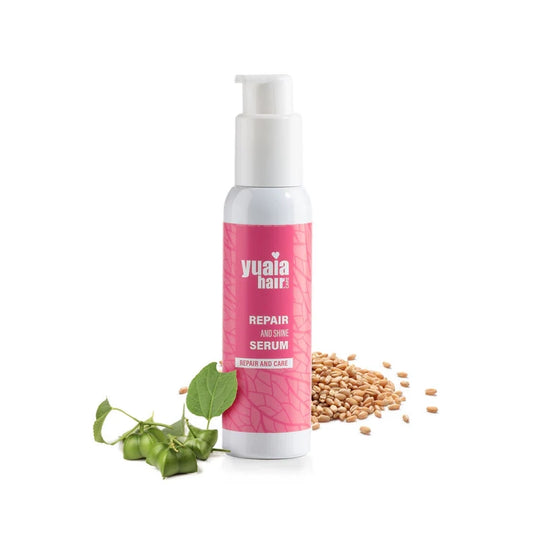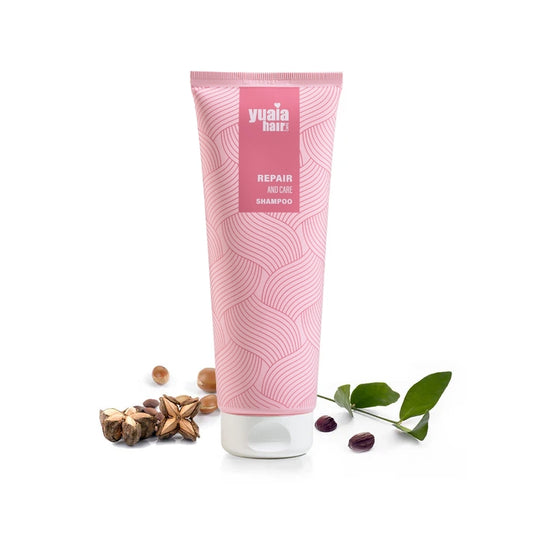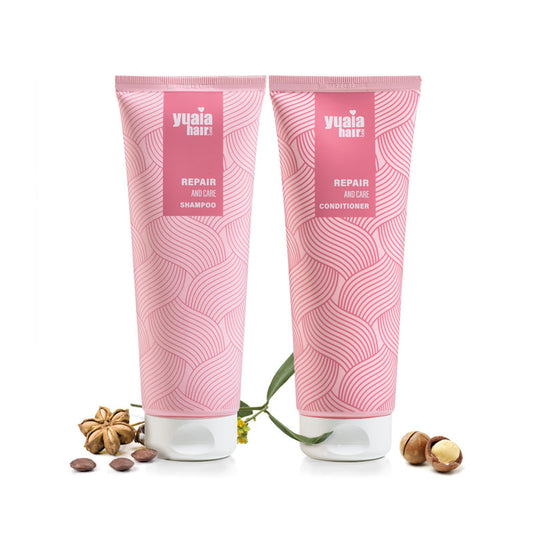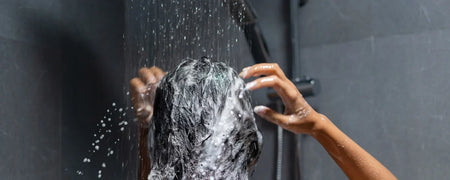
What are the signs of hard water on hair?
Hard water exposure can significantly impact the health and appearance of your hair. The minerals present in hard water, such as calcium and magnesium, can leave noticeable effects over time. Recognizing these signs early can help you take steps to protect your hair.
Dryness, brittleness, and split ends
Hard water often leads to dryness and brittleness in hair, as the mineral deposits it leaves behind create a barrier that blocks moisture absorption. This lack of hydration weakens the hair's structure, making it more vulnerable to breakage. Over time, this damage can result in split ends, further contributing to an unhealthy appearance. The combination of dryness and structural weakness can leave hair feeling rough, unmanageable, and prone to additional damage.
Dullness and lack of shine
Hard water on hair can strip away your hair's natural shine, leaving it dull and lifeless. The minerals in hard water, such as calcium and magnesium, form a coating on the hair strands, which diminishes their ability to reflect light. This buildup creates a rough texture, further reducing the vibrant, glossy look many desire. Over time, hair may appear lackluster and feel less smooth to the touch.
Increased tangling and frizz
Mineral buildup from hard water on hair often lifts the hair cuticle, resulting in a rough and uneven texture. This disruption makes hair strands more prone to catching on each other, increasing tangling and leading to persistent frizz. The rougher surface also causes hair to lose its smoothness, making styling difficult and time-consuming. Over time, this can leave hair feeling unmanageable and looking untidy, even with regular care.
Scalp irritation and dandruff
Hard water impacts not only your hair but also the health of your scalp. The mineral residues it leaves behind can disrupt the scalp’s natural oil balance, leading to dryness and irritation. This imbalance often results in itchiness and flaking, conditions commonly mistaken for dandruff. Over time, the buildup can clog hair follicles, exacerbating the irritation and further disrupting scalp health. To combat these effects, regular use of clarifying treatments and scalp-focused care, such as gentle exfoliation or hydrating products, can help restore balance and alleviate the discomfort caused by hard water exposure.
Accelerated color fading
For those with colored hair, hard water can significantly impact the longevity and vibrancy of hair dye. The minerals in hard water, such as calcium and magnesium, interact with the pigments in the dye, causing them to break down more quickly. This results in faster fading and a duller appearance over time. Additionally, mineral buildup on the hair strands can create a barrier that prevents the dye from bonding effectively during coloring sessions. To maintain your color’s vibrancy, consider using shampoos specifically designed for colored hair and incorporating treatments to remove mineral deposits regularly.
Can hard water cause hair loss?
Hard water itself is not a direct cause of hair loss, but its effects can contribute to factors that may lead to hair thinning or shedding. Mineral buildup from hard water can weigh hair down and create a coating that blocks hair follicles, potentially impeding healthy hair growth. Over time, this buildup weakens hair strands, making them more prone to breakage, which might appear as hair loss. Additionally, hard water often exacerbates scalp issues such as dandruff, dryness, and irritation, all of which can lead to excessive shedding if left untreated.
Research shows that while hard water doesn't directly cause hair loss, the combination of buildup, weakened strands, and scalp irritation creates an environment where hair health is compromised. To mitigate these effects, it’s important to use clarifying shampoos to remove buildup, adopt a moisturizing hair care routine, and focus on maintaining scalp health through hydration and gentle cleansing practices.
Can hard water cause dandruff?
Yes, hard water can contribute to dandruff by disrupting the scalp's natural oil balance. Minerals such as calcium and magnesium accumulate on the scalp, leading to dryness, irritation, and flaking. This mineral buildup creates conditions that encourage dandruff development and can worsen existing scalp issues. To address this, regular use of clarifying shampoos can help remove residues and maintain a healthier scalp. Scalp exfoliation is also beneficial for reducing flaking and promoting balance. Additionally, ensuring that hair and scalp are thoroughly rinsed during washing can help minimize the effects of hard water and prevent further irritation.
Hard water hair treatments
Addressing the impact of hard water on your hair requires targeted treatments to minimize damage and buildup. Installing water softeners or shower filters is one of the most effective solutions, as these devices reduce the mineral content in your water. This prevents excessive residue from accumulating on hair and scalp.
DIY rinses, such as diluted apple cider vinegar or citrus solutions, can help dissolve mineral deposits, restoring hair’s natural shine and softness. These rinses are simple to prepare and can be incorporated into your routine weekly for noticeable results.
Professional salon treatments are also an excellent option for tackling hard water damage. Chelating treatments specifically target mineral buildup and can rejuvenate hair. Complementing these methods, daily hair care practices such as using leave-in conditioners or serums can provide a protective barrier against mineral deposits, reducing their impact over time.
Shampoo for hard water
Choosing the right shampoo is essential for managing the effects of hard water on your hair. Products labeled as chelating or clarifying shampoos are particularly effective in removing mineral buildup, as they contain ingredients that bind to minerals for easy removal during washing. However, these shampoos should be used sparingly to avoid stripping your hair of its natural oils.
For regular use, sulfate- and silicone-free shampoos are a great option, as they gently cleanse while minimizing residue buildup. Our Repair and Care Shampoo is an ideal choice, offering nourishment and protection to help counteract the impact of hard water. Incorporating this shampoo into your routine can support healthier, more manageable hair even in hard water conditions.
Natural remedies for hard water damage
Combatting the effects of hard water on hair can be done effectively using natural remedies that restore moisture, remove mineral buildup, and soothe the scalp.
Apple cider vinegar rinse
Diluting one part apple cider vinegar with two to four parts water and using it as a final rinse after shampooing helps dissolve mineral residue, balance your hair's pH, and restore its natural shine. This simple treatment also softens the hair, making it easier to manage.
Aloe vera treatment
Aloe vera gel, applied directly to the scalp and hair, deeply hydrates while soothing irritation caused by mineral deposits. Its anti-inflammatory properties promote a healthy scalp, reducing dryness and flaking often associated with hard water exposure.
How do I protect my hair from hard water?
Preventing hard water damage begins with practical measures to limit exposure to mineral buildup. Installing a water softener or showerhead filter is one of the most effective ways to reduce the mineral content in your water, addressing the issue at its source. Periodic use of chelating or clarifying shampoos can help remove existing buildup, but it’s important to use these sparingly to avoid over-drying your hair.
Adding sulfate- and silicone-free shampoos to your regular routine provides a gentler cleansing option, helping to maintain your hair’s natural moisture balance and reducing the risk of further buildup. Following up with deep conditioning treatments ensures your hair stays hydrated and manageable despite hard water exposure.
Adjusting your hair care routine to reflect the water quality in your area is another important step. Regular rinses with diluted apple cider vinegar can restore pH balance and dissolve mineral residues, while leave-in conditioners can create a protective barrier against further damage. By integrating these practices into your routine, you can effectively manage the effects of hard water on your hair.
Protecting your hair from hard water
Hard water can take a toll on your hair, but simple strategies can help reduce its impact. Installing a water softener or using a shower filter minimizes mineral content in your water, protecting your hair from buildup. Selecting shampoos designed for hard water, such as clarifying or chelating formulas, effectively removes residue while maintaining hair health. Adjusting your routine by incorporating hydrating treatments and regular rinses with apple cider vinegar can further restore balance and improve manageability. With these measures, you can maintain strong, healthy hair, even in areas with hard water.
 2-5 day delivery
2-5 day delivery
 25.000+ satisfied customers
25.000+ satisfied customers
 Satisfaction Guarantee
Satisfaction Guarantee



















